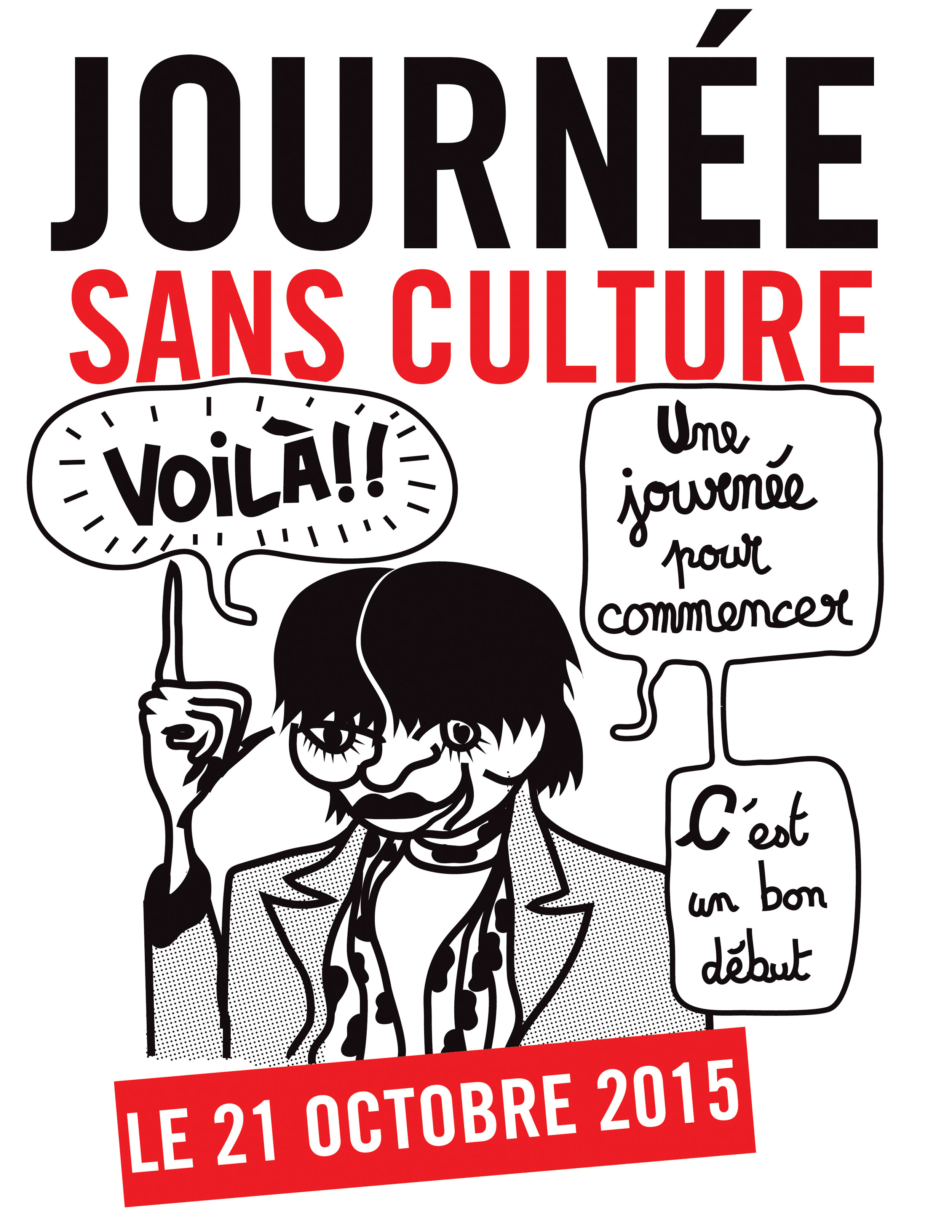Journée sans culture
With the Journée sans culture collective
A day of strike and public discussion organized by the Journée sans culture collective
Théâtre Aux Écuries,
Centrale Galerie Powerhouse (Montreal)
Centrale Galerie Powerhouse (Montreal)
2015



Journée sans culture is not an art project, but a political project. It is a self-run organization, managed on a volunteer basis by artists and cultural workers from Quebec, and born as a reaction against the exhortation to do more with less—less money, less time, less care, and less art.
Its first initiative was a collective event on October 2015—a day of reflection that doubled as a symbolic strike uniting artists and cultural workers. The day marked a collective pause to discuss what most matters to us, and to think about the current state and future of the arts. This first assembly gathered more than 300 people at Théâtre Aux Écuries (Montreal), and was followed by a series of other projects: A discussion on the place of women (“Why Women?” at La Centrale Galerie Powerhouse, December 5, 2015), a pointed submission to the recent consultations on the renewal of Quebec’s cultural policy addressing the reality faced by artists and cultural workers (August 2016), and a book-length publication assembling contributions produced in the wake of first edition of the JSC (To Spoil the Party, to Set Our Joy Ablaze, 2016).
Journée sans culture is Edith Brunette, Mirna Boyadjian, Jenny Cartwright, Marine Gourit, Priscilla Guy, Arkadi Lavoie Lachapelle, Catherine Lavoie-Marcus, François Lemieux and Pablo Rodriguez, as well as dozens of other fabulous volunteers.
journeesansculture.ca ↗
Interviews about the project:
La cause de la pause ↘,
Interview by Jérôme Delgado,
Le Devoir.
Entretien avec le comité organisateur de la journée dans culture. Rendre visible aux autres et à soi-même ↘,
by Josianne Poirier, Spirale.
Its first initiative was a collective event on October 2015—a day of reflection that doubled as a symbolic strike uniting artists and cultural workers. The day marked a collective pause to discuss what most matters to us, and to think about the current state and future of the arts. This first assembly gathered more than 300 people at Théâtre Aux Écuries (Montreal), and was followed by a series of other projects: A discussion on the place of women (“Why Women?” at La Centrale Galerie Powerhouse, December 5, 2015), a pointed submission to the recent consultations on the renewal of Quebec’s cultural policy addressing the reality faced by artists and cultural workers (August 2016), and a book-length publication assembling contributions produced in the wake of first edition of the JSC (To Spoil the Party, to Set Our Joy Ablaze, 2016).
Journée sans culture is Edith Brunette, Mirna Boyadjian, Jenny Cartwright, Marine Gourit, Priscilla Guy, Arkadi Lavoie Lachapelle, Catherine Lavoie-Marcus, François Lemieux and Pablo Rodriguez, as well as dozens of other fabulous volunteers.
journeesansculture.ca ↗
Interviews about the project:
La cause de la pause ↘,
Interview by Jérôme Delgado,
Le Devoir.
Entretien avec le comité organisateur de la journée dans culture. Rendre visible aux autres et à soi-même ↘,
by Josianne Poirier, Spirale.



Posters by Clément de Gaulejac


Drawings by Arkadi Lavoie-Lachapelle







Drawings by Julie Delporte
Projects
Going to, Making Do, Passing Just the Same
Vases communicants
Lits de Procuste
Sea Lanes
Fly or Die
Esquisse pour une comédie musicale entrepreneuriale
Dépenses improductives
#ownit
Journée sans culture
Contre-monument à 100 millions de brins d’herbes identiques
Cuts Make the Country Better
Faut-il se couper la langue?
Consensus
Caméraroman
Poses pour caméras de surveillance
Prescriptions pour un bon ordre social
Vases communicants
Lits de Procuste
Sea Lanes
Fly or Die
Esquisse pour une comédie musicale entrepreneuriale
Dépenses improductives
#ownit
Journée sans culture
Contre-monument à 100 millions de brins d’herbes identiques
Cuts Make the Country Better
Faut-il se couper la langue?
Consensus
Caméraroman
Poses pour caméras de surveillance
Prescriptions pour un bon ordre social